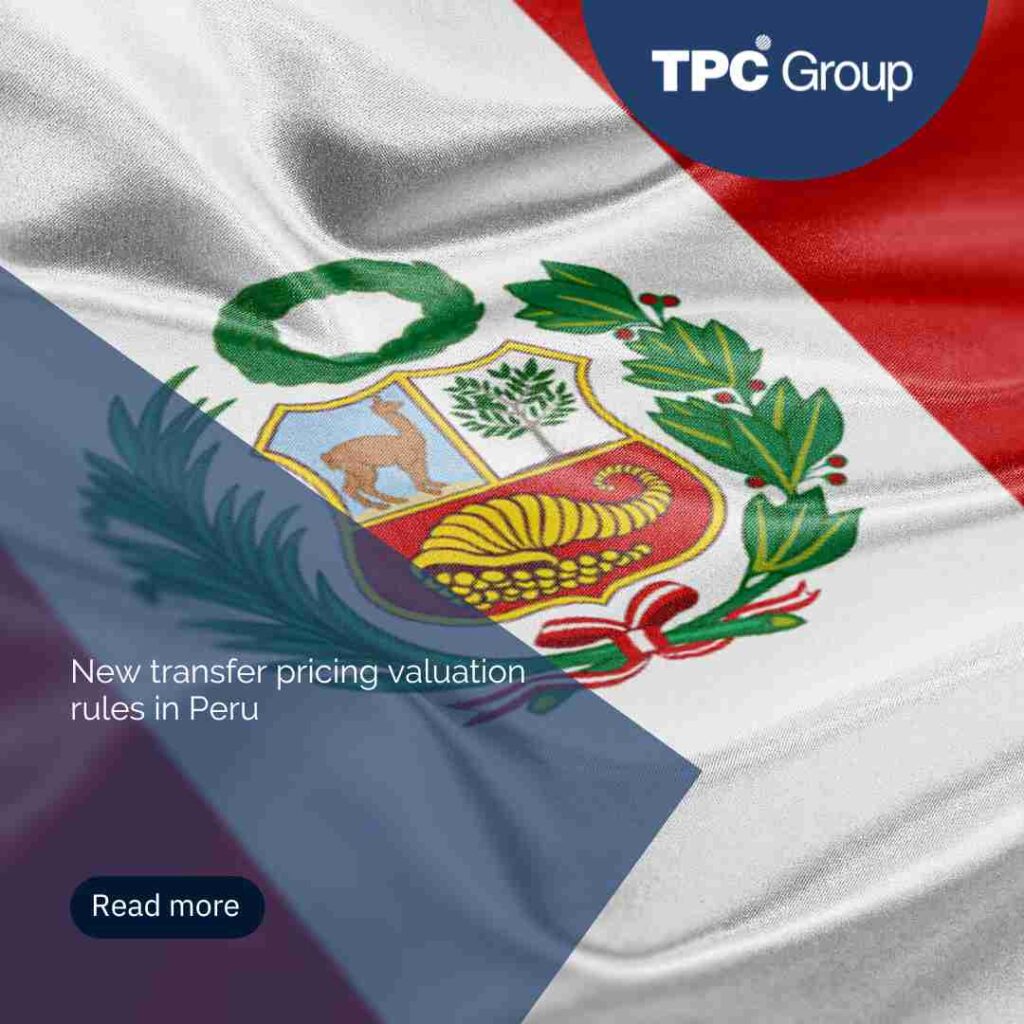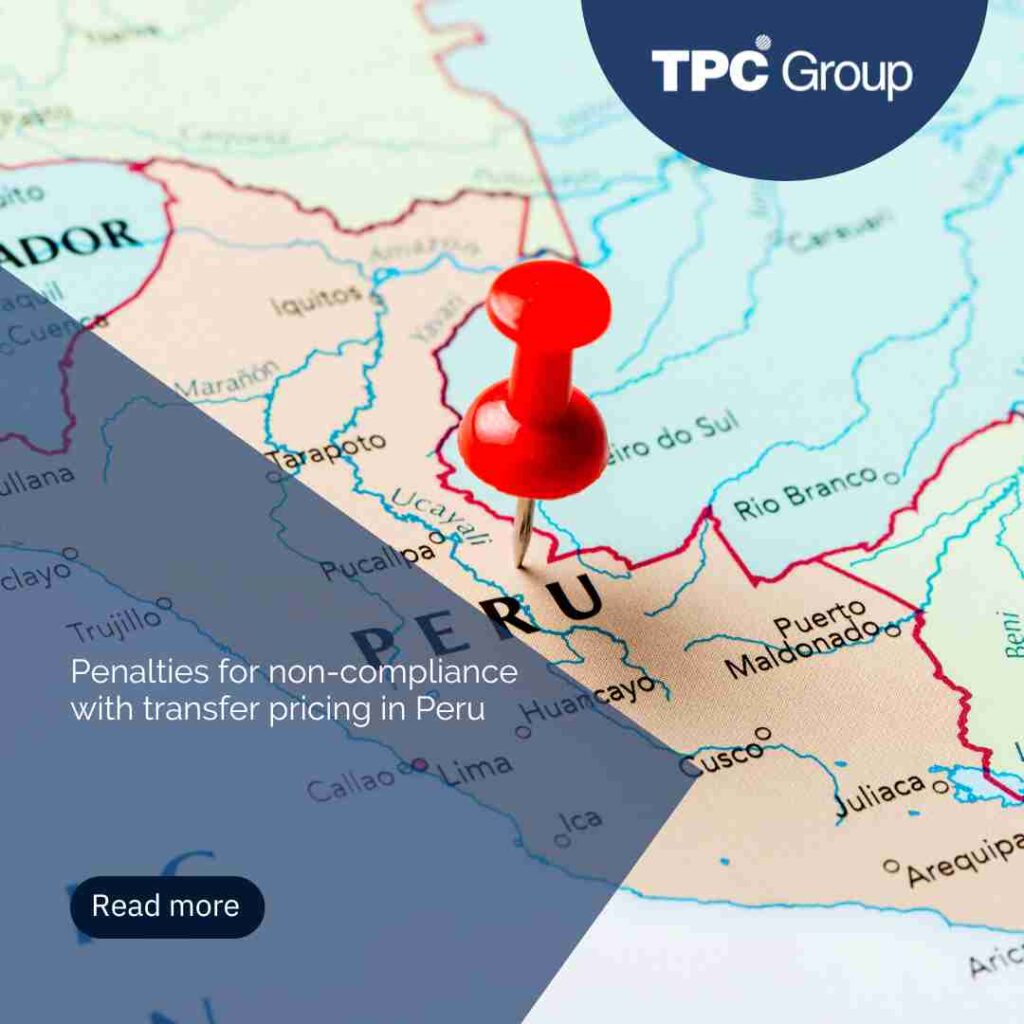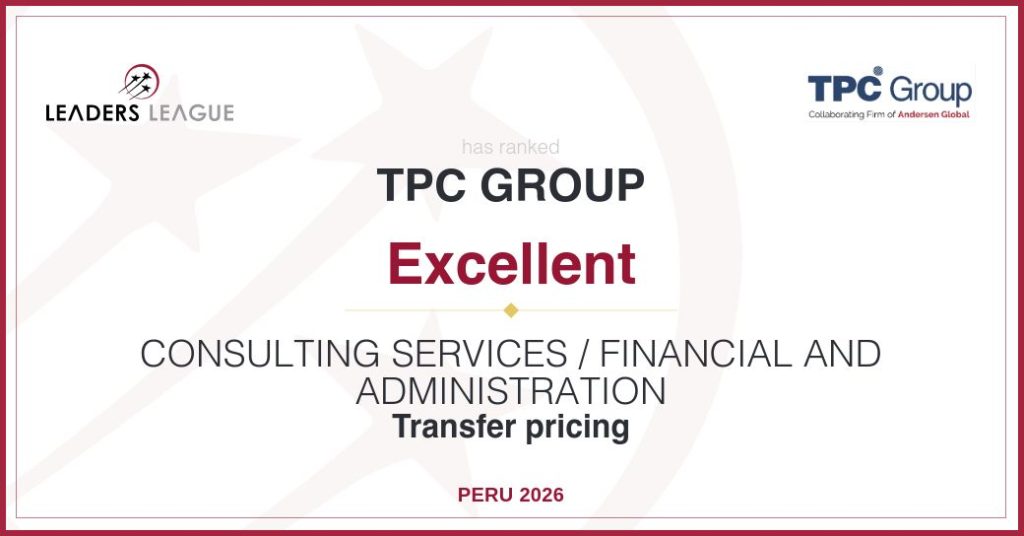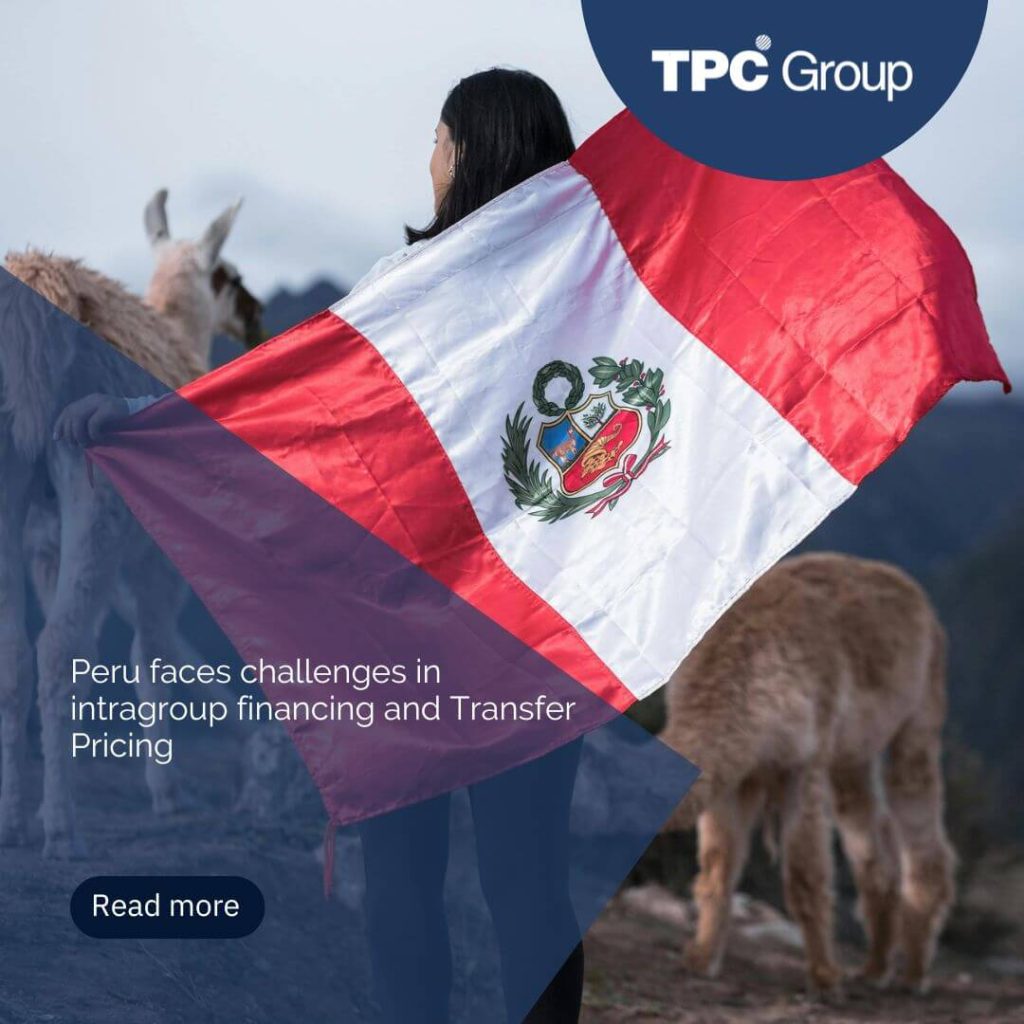Transfer Pricing in Peru has been regulated for more than 16 years. This article briefly addresses the regulation of this matter, such as its application scope, definitions, reporting parties, and non-compliance penalties.
Transfer Pricing rules in Peru were introduced to the Income Tax Law, approved by Legislative Decree No. 744, more than 15 years ago.
Conversely, Legislative Decree No. 1312 reformed the rules on the matter in 2017.
This decree, among other provisions, establishes new Informative Affidavits, such as the Local Report, Master File, and Country-by-Country Report (CbC Report), in line with the supporting documentation indicated in Action 13 of the BEPS (Base and Erosion and Profit Shifting) Plan issued by the Organization for Economic Cooperation and Development (OECD).
Such statements were additionally regulated by Superintendency Resolutions N°163-2018/SUNAT and N°014-2018/SUNAT.
Transfer Pricing Definition
It is defined as agreed prices or values in related party transactions. They are also called Intercompany Transactions.
The governing rule is the Arm’s Length Principle, which stipulates that agreed prices among the related parties are at the market value, i.e., the agreement among the independent parties.
Pricing Transfer Application Scope in Peru
According to Article 108 of the Legal Regulations, the transactions subject to the Peruvian system will be the following:
- The performed ones between a taxpayer in the country and the related parties.
- The performed ones between a taxpayer resident in Peru and taxpayers domiciled in non-cooperative countries or lands with low or zero taxation.
- The performed ones with parties whose income from such transactions is subject to a preferential tax regime.
Related Parties Definition in Peru
Article 32-A, paragraph b), according to Article 24 of the Regulations, indicates the cases in which the relationship is established. Therefore, the following shall be considered as related parties:
- A person, either natural or legal, owns more than 30% of the capital of another company.
- The same person, either natural or legal, directly or indirectly owns more than 30% of the capital of two or more legal entities.
- The above percentage belongs to spouses or individuals whose relationship is up to the second degree of consanguinity or affinity.
- The capital of two or more legal entities belongs to common partners exceeding 30%.
- Companies or entities have directors, managers, administrators, or other executives in common.
- Two or more legal entities consolidate their financial statements.
- The contracting parties with the business collaboration contract with independent accounting if they own more than 30% of the assets of the contract or when one of the parties has the power of decision.
- The associate in a joint venture contract, when it has more than 30% in the results or profits of the business.
- Permanent establishments in the country regarding its parent company abroad, along with their relationship.
- The company domiciled in Peru regarding its permanent establishments abroad will also be related.
- The legal entity or individual that strongly influences the administrative decisions of one or more individuals or legal entities. It shall be understood that such influence is exercised when, in the agreement adoption, it exercises or controls an absolute majority.
- Related parties will be considered when a legal person or entity resident in the country makes 80% of its sales, rendering services with another person, company, or entity, as long as the latter represents at least 30% of its purchases.
Once related, it will be in force from that moment until the end of the taxable year. If a dominant influence configures the relation, it will be in force from the agreement adoption until the closing of the fiscal year. In the case of relation by percentage of sales, it will be in force for the following fiscal year.
Transfer Pricing Methods in Peru
According to Article 32-A, paragraph e) of the Law, the following methods shall be employed to determine whether the prices agreed upon among related parties are at market value:
- Comparable Uncontrolled Price Method.
- Resale Price Method.
- Cost Plus Method.
- Profit Split Method.
- Residual Profit Split Method.
- Transactional Net Margin Method.
- Other Methods.
It should be noted that for other methods, the law indicates that they will be employed under the provisions of the Regulations. Conversely, the latter does not contain provisions in this regard, thus not applicable.
Current regulatory update – Supreme Decree No. 302-2025-EF
In December 2025, Supreme Decree No. 302-2025-EF was published in the Official Gazette El Peruano, introducing specific regulations for the application of the so-called “other methods” of valuation in transfer pricing, provided for in paragraph 7) of section e) of Article 32-A of the Income Tax Law.
This regulatory standard is official and in force, and its purpose is to complement the transfer pricing framework in Peru when traditional methods do not adequately reflect the economic reality of certain intra-group transactions, as is the case with intangible assets, complex transactions, or the absence of reliable comparables.
Among the main changes introduced by the decree are:
- The adaptation of the Income Tax Law Regulations to clearly define the scope of the rules applicable to traditional methods (paragraphs 1) to 6)) and other alternative methods.
- The incorporation of the new Article 113-B, establishing a technical framework for the application of other valuation methods in accordance with accepted international best practices as of January 1, 2025.
- The requirement that the technical report supporting the application of alternative methods contain at least the same minimum information required under current international valuation standards.
- The obligation for taxpayers to have supporting documentation justifying the methodological choice and the need to resort to an alternative method, which may be required by SUNAT during verification or audit processes.
This regulatory update contributes to providing greater legal certainty to the transfer pricing regime in Peru and requires companies to strengthen their technical reports and documentation when using methods other than traditional ones, ensuring that they are technically and documentarily supported.
Profit Test in Peru
The Transfer Pricing legislation in Peru has incorporated a special provision referring to the services received by the taxpayer from related parties, either an individual or a related company, also known as Intra-group Services.
Thus, paragraph i) of Article 32-A of the Income Tax Law states that without prejudice to the other provisions indicated in this law, services received from related parties may only be deducted to the extent that they comply with the Profit Test.
Hence, it will be fulfilled when the service provides an economic or commercial value to whoever receives it, maintaining or improving his/her position in the market. It occurs when independent parties would have satisfied this by themselves or through a third party.
The documentation related to the Profit Test should provide information regarding the nature of the profit, its needs, costs, and expenses of the service, and the criteria for their allocation.
Likewise, the Intra-group Services may be of low added value.
According to this section, those with the characteristics of an auxiliary activity are not the main activities of the taxpayer or the group, do not require the use of intangible assets, and do not entail high risks for any parties.
These services should not margin more than 5% of the costs and expenses of the supplier.
Informative Affidavit of Transfer Pricing in Peru
Taxpayers subject to these rules were required, until 2015, to file an Informative Affidavit and a Technical Study, notwithstanding according to amended paragraph g) of Article 32-A of the Law, it is stated that taxpayers subject to the Transfer Pricing rules will be required to file up to three Informative Affidavits.
Local Report
According to the first paragraph of the above-quoted section, taxpayers who have carried out transactions with related parties and/or with subjects residing in non-cooperating, low, or null tax countries or preferential regimes and have earned income in that fiscal year for more than 2300 UIT (Unidad Impositiva Tributaria – Tax Unit) are required to file such report.
According to Article 2 of Superintendence Resolution N°014-2018/SUNAT, this report consists of four annexes to be completed by the taxpayer according to the number of transactions subject to these valuation standards.
Thus, those taxpayers whose operations subject to the Transfer Pricing regime exceed 100 Tax Units up to 400 Tax Units will be required to file Annex I of the Local Report.
In case of exceeding the 400 Tax Units, the taxpayer will have to file the four annexes.
The Monthly Obligation Schedule will determine the due date for its filing in May of the taxable year following the transactions performed through Virtual Form 3560.
Master File
This report should contain the organizational structure of the economic group, business description, Transfer Pricing, and policies, among other requirements.
Taxpayers who are members of a group whose income accrued in the taxable year exceeds 20,000 Tax Units will be obliged to pay this tax.
According to Article 116 of the Regulation, a group is a group of persons, companies, or entities related by ownership or control in such a way that they are obliged to consolidate their Financial Statements under the accounting standards.
In turn, Article 2 of the Superintendence Resolution N°163-2018/SUNAT adds as a requirement to the above-quoted that the taxpayer has carried out transactions within the Transfer Pricing scope for an amount exceeding 400 Tax Units.
As for the filing deadline, it will be done according to the Monthly Obligation Schedule for the September period of the following year of the transactions through Virtual Form 3561.
Country by Country Report
This report will contain information about the income of each group member, business activities, and taxes paid, among others.
According to paragraph b) of Article 116 of the Regulation, the parent company domiciled in the country of a Multinational Group shall be obliged, provided that its income for the taxable year before the one being reported is greater than S/. 2,700,000,000.00.
Likewise, numeral 10.1.2 of Article 10 of the Superintendence Resolution N°163 2018/SUNAT states that the taxpayer domiciled in the country, a member of a Multinational Group whose income amounts to the amount already indicated will also be required to file this report as long as he/she is in any of the following assumptions:
- If the Parent Company designated him/her as its representative for this report.
- The non-domiciled parent is not required in its jurisdiction to file this report.
- The parent company jurisdiction has an exchange agreement for this report but not a competent authority agreement.
- When there is a Country-by-Country Report Exchangeagreement and a competent authority agreement, SUNAT (Superintendendcia Nacional de Aduanas y de Administración Tributaria – National Superintendence of Customs and Tax Administration) becomes aware of any systematic non-compliance by any of the entities after having notified it.
Regarding this report, the deadline for filing it will be according to the schedule of obligations for September, which expires in October.
Regarding the deadline at the same time, the Superintendence Resolution N°0155-2020/SUNAT, published in September 2020, has extended the filing of such report for the reporting parties as indicated in assumptions b, c, and d, until the last working business day of the month following, when SUNAT publishes on its website the approval of the confidentiality standard assessment and information security by the OECD.
The OECD Global Forum has already communicated to Peru the approval of the standard. Nonetheless, it has not been published on the website of the SUNAT to date.
Transfer Pricing Documentation in Peru
Taxpayers must keep their related party transactions documentation due to be required by the Tax Administration.
Transfer Pricing Non-Compliance Penalties in Peru
The infractions due to failure to file Informative Affidavits are established in paragraphs 2 and 4 of Article 176 of the Peruvian Tax Code.
If the reporting is not within the established deadline or is incomplete, the fine would amount to 0.6% of the net income with a maximum of 25 Tax Units.





